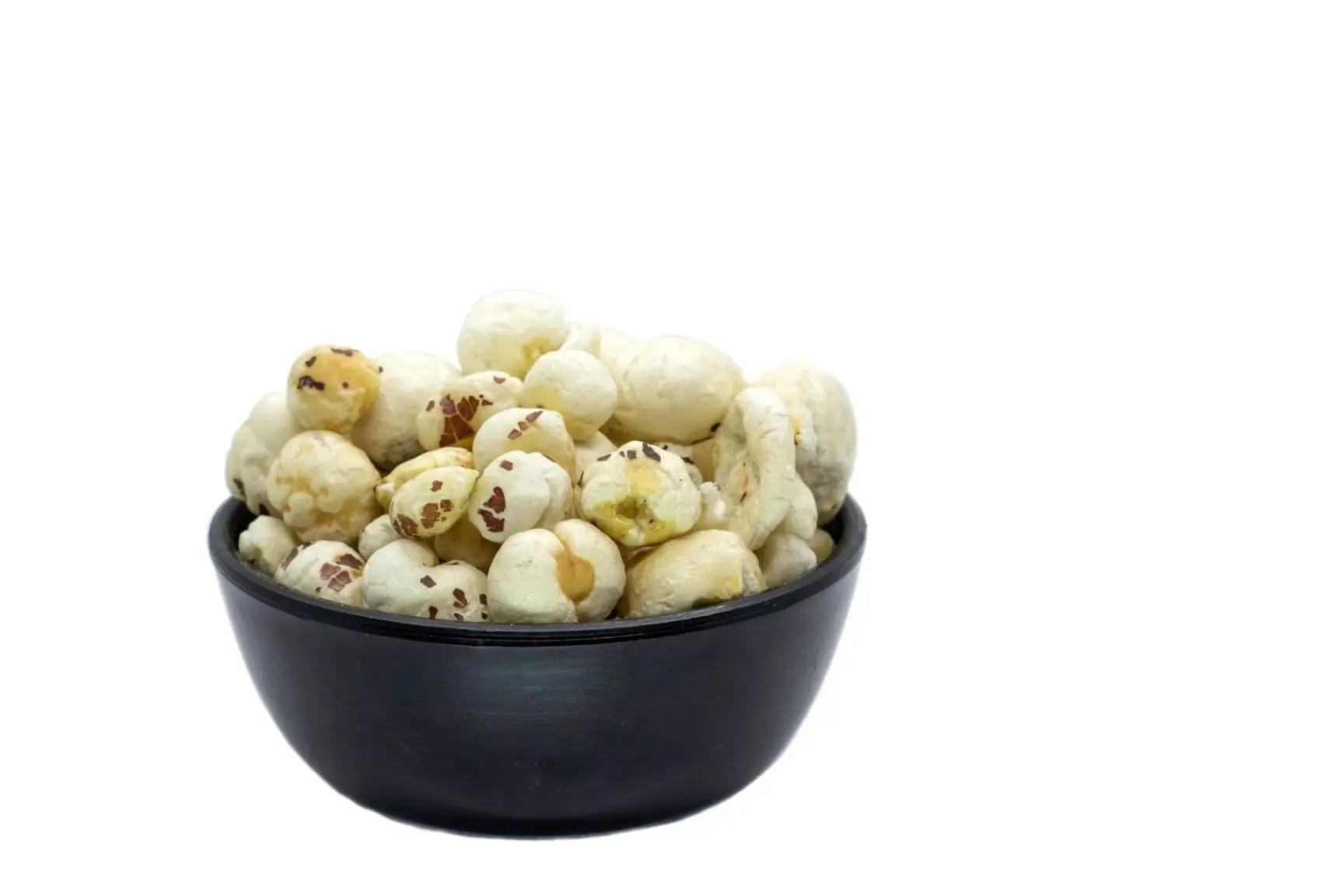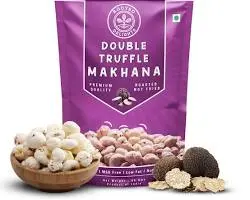In the heart of India's wetlands, a humble aquatic plant yields a hidden treasure: Makhana, also known as Fox Nuts or Lotus Seeds. Revered in Ayurvedic tradition for centuries, this nutrient-dense "super snack" is now breaking out of its niche and conquering global markets.
Driven by the explosive demand for healthy, gluten-free, and plant-based snacks, Makhana is poised to become India's next big export success story. Its light, crunchy texture, mild flavor, and impressive nutritional profile (high in protein, fiber, and low in calories) make it an ideal guilt-free indulgence.
For Indian entrepreneurs, this is a golden opportunity to leverage a traditional Indian product to meet a modern global craving. This comprehensive guide will walk you through every step, from processing and certifications to navigating the export process and connecting with the top healthy snack distributors in the USA.

Part 1: The Makhana Moment – Why Export This Super Snack?
The global snack market is a multi-billion dollar industry, and the "healthy snack" segment is its fastest-growing component. Makhana perfectly aligns with current consumer trends:
Gluten-Free & Allergen-Friendly: Naturally gluten-free, making it suitable for a broad market, including those with celiac disease or gluten sensitivities.
Plant-Based Powerhouse: Appeals to the booming vegan and vegetarian demographic.
Nutrient-Dense: High in protein, fiber, magnesium, and potassium, yet low in fat and calories.
Versatile: Can be flavored sweet or savory, used in trail mixes, breakfast cereals, or as a standalone snack.
Unique Selling Proposition: "Lotus seeds" have an exotic, natural appeal that stands out from typical puffed grains.
India's Monopoly: India, particularly the Mithila region of Bihar, produces over 80% of the world's Makhana, giving you an unparalleled sourcing advantage.

Part 2: The A-Z Export Process: From Pond to Packaged Perfection
Exporting Makhana, especially as a processed, retail-ready snack, requires meticulous attention to quality, hygiene, and compliance.
Step 1: Your Business & Legal Foundation
Register Your Company: Establish a legal entity (e.g., Proprietorship, LLP, Private Limited Company).
Get Your IEC (Importer-Exporter Code): This mandatory 10-digit license from the DGFT (Directorate General of Foreign Trade) is your primary export permit.
GST Registration: Obtain a GSTIN. Exports are "zero-rated," meaning you won't charge GST on your export sales, but you need the registration to claim Input Tax Credit on your purchases.
Open a Business Current Account: A dedicated bank account for all export transactions.
Step 2: Crucial Registrations & Certifications
FSSAI Food License: Obtain a Central FSSAI (Food Safety and Standards Authority of India) License. This is mandatory for all food product manufacturers and exporters.
APEDA RCMC: Get a Registration-Cum-Membership Certificate from APEDA (Agricultural and Processed Food Products Export Development Authority). Makhana falls under their purview for processed foods.
US FDA Registration: If you are directly exporting to the USA, your facility must be registered with the U.S. Food and Drug Administration (FDA). You will also need to comply with the FSMA (Food Safety Modernization Act) rules.
Organic Certification (Highly Recommended): If you intend to market "organic Makhana," you will need NPOP (National Programme for Organic Production) certification in India, and potentially equivalent certifications for the US market (like USDA Organic). This commands a significant premium.
Step 3: Sourcing & Processing (Quality Control is King!)
Sourcing Hub: The Mithila region of Bihar is the primary source. Establish strong relationships with local farmers and processors.
Traditional vs. Mechanized Processing:
Traditional (Hand-Processed): Often yields superior puffing quality but can be inconsistent and less hygienic.
Mechanized Processing: Investment in modern processing units ensures uniform roasting, hygienic handling, and consistent quality, crucial for export.
Quality Parameters:
Puffing Ratio & Size: Uniformly puffed and sized nuts.
Moisture Content: Crucial for shelf life (typically 3-5%).
Absence of Impurities: No shells, debris, or foreign matter.
Lab Testing: Conduct regular lab tests for microbiological contamination, heavy metals, and pesticide residues from NABL-accredited labs.
Step 4: Packaging & Labeling (Retail-Ready Focus!)
Primary Packaging: For snacks, use high-barrier, food-grade pouches (often with a metallized layer) to protect against moisture, oxygen, and light. Resealable pouches are preferred.
Secondary Packaging: Sturdy corrugated cartons for bulk shipping.
Labeling (USA Specific): Your labels must comply with US FDA regulations:
Product Name (e.g., "Roasted Fox Nuts" or "Puffed Lotus Seeds").
Net Weight (in both metric and avoirdupois units).
Ingredients List (clear and compliant with allergen declarations).
Nutrition Facts Panel (NFP): This is mandatory for packaged food in the USA.
Manufacturer's Name and Address.
Country of Origin ("Product of India").
Allergen warnings (e.g., "Manufactured in a facility that also processes nuts").
Step 5: Logistics & Shipping
Freight Forwarder: Partner with an experienced freight forwarder specializing in food exports to the USA. They will handle ocean freight (or air freight for smaller, high-value shipments), customs clearance, and all paperwork.
Port Selection: Utilize major ports with good connectivity, such as Nhava Sheva (JNPT), Mundra, or Kolkata.
HS Code: The Harmonized System (HS) Code for Makhana (popped lotus seeds) is typically 1212.93.00 ("Lotus seeds").

Part 6: Mandatory Export Documents
Commercial Invoice cum Packing List
Bill of Lading (for sea freight) or Airway Bill (for air freight)
Certificate of Origin
FSSAI License Copy
APEDA RCMC Copy
US FDA Registration Number (for US exports)
Certificate of Analysis (Lab Test Report)
Phytosanitary Certificate (if required by buyer/importing country, though less common for processed snacks).
Part 7: Top 3 Healthy Snack Distributors in the USA
Connecting with the right distributors is crucial for market entry. These distributors have established networks with supermarkets, health food stores, and online retailers across the USA.
While direct contact information might vary, these are major players who handle a diverse portfolio of healthy and specialty foods. You'll need to approach their procurement teams with a strong product pitch, samples, and all necessary certifications.
1. UNFI (United Natural Foods, Inc.)
Profile: The largest publicly traded wholesale distributor of health and specialty food products in North America. They supply natural food stores, supermarkets, and mass market retailers.
Why them? They have an immense reach and are constantly looking for innovative, healthy, and natural snack options. If you can get into UNFI, you gain access to thousands of stores.
Approach: Focus on your Makhana's organic/natural credentials, unique nutritional profile, and clean label.
2. KeHE Distributors
Profile: A leading distributor of natural, organic, specialty, and fresh products to natural food stores, grocery chains, and other retail channels.
Why them? Similar to UNFI, KeHE has a vast network and a strong focus on the "natural and organic" space, making them an ideal partner for Makhana. They are known for discovering emerging brands.
Approach: Highlight your product's story, its "superfood" status, and how it fills a gap in the healthy snack aisle.
3. DPI Specialty Foods
Profile: A large specialty food distributor with a focus on gourmet, ethnic, and international products. They service a wide range of retailers.
Why them? Given Makhana's "exotic" and "ethnic" origins, DPI is well-positioned to introduce it to retailers looking for unique global flavors and ingredients. They cater to a broader spectrum of stores, including mainstream grocery and specialty gourmet shops.
Approach: Emphasize Makhana's unique origin, cultural significance, and versatility as a snack.
General Tip for Approaching Distributors: Have your samples ready, all certifications (especially FDA & Organic if applicable), a professional sales deck, and a clear understanding of your pricing strategy (FOB India, CIF to US ports, DDP if possible).

Conclusion: Pop Your Way to Profit!
Makhana is more than just a snack; it's a symbol of India's ancient wisdom meeting modern health trends. By meticulously navigating the export process, ensuring top-tier quality, and strategically partnering with the right distributors, Indian entrepreneurs can truly pop their way to global success. The American market is hungry for healthy innovation, and your Makhana is perfectly positioned to satisfy that craving.